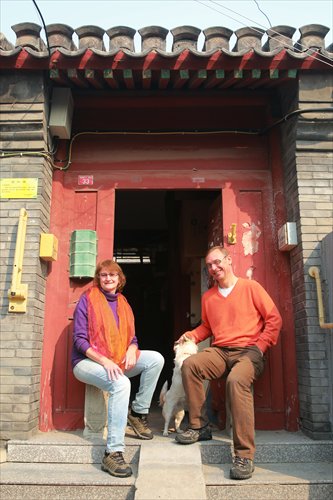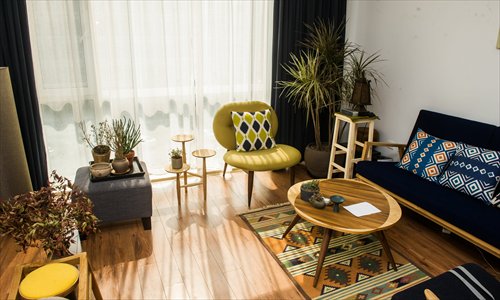


Two foreign guests pose for a photograph outside Arti Xia's Airbnb-listed courtyard home in Xicheng district. Photo: Courtesy of Arti Xia
Arti Xia, a 40-year-old Beijinger who lives just five minutes walk from Tiananmen Square, has been hosting guests in his courtyard home through Airbnb since May last year.
"We decided to rent out our rooms for three reasons: to make money, to make friends and to provide a window for foreigners into the lives of local Chinese people," said Xia, who works as a freelance photographer.
Since launching in 2007, Airbnb, an online platform that allows people to find and rent out lodgings, has become a popular alternative to traditional accommodations like hostels and hotels.
Airbnb has close to 1 million rental listings on its website, with accommodation options in almost every major city in the world.
According to a New York Times article in February, the website booked stays for 20 million people in the past year alone.
In China however, uptake has been slow.
While the company was unwilling to disclose the number of rental properties in the country, a PR employee told Metropolitan that their immediate focus was to promote Airbnb as an accommodation option for Chinese tourists going abroad.
Xia is among the small but enthusiastic community of Beijing's Airbnb hosts.
"The courtyard where I live has housed three generations of my family since the 1910s," said Xia.
For 420 yuan ($68) per night, guests can stay in a 40-square-meter room in the courtyard lodging, which is equipped with a standalone toilet, a TV, disposable slippers and toothbrushes.
"We're also very passionate about hanging out with our guests on terrace," said Xia.
Besides Xia's refurbished courtyard residence, a quick look at other Airbnb options in the city include bungalows and lofts in hutong neighborhoods and tastefully decorated apartments in CBD areas with Scandanavian-style furniture.

The living room of an Airbnb-listed apartment in Wangjing, Chaoyang district, which also serves a showroom for the host Feng Shu's furniture and interior design company. Photo: Li Hao/GT
Slow embrace
Kathy Lee, a researcher for Airbnb focused on user experience, told the New York Times that "Airbnb doesn't do as well in collectivist countries," citing Japan as an example.
In Tokyo, there are about 2,500 listings, "less than half of what can be found in Madrid, less than one-fifth of what can be found in Paris," the report says.
Lee's description of Japan as a collectivist country that is culturally avoidant of uncertainty might also be applied to China, where users of popular question-and-answer website Zhihu have expressed skepticism about the chances of Airbnb's model taking off in the country.
Many users noted that most Chinese people would be uncomfortable with the idea of renting their homes to strangers on a short term basis.
"Airbnb's model relies on mutual trust between host and guest," wrote a user with the nickname Pan Pan.
"But China still lacks credible social networking website."
"How can a host ensure the security of his or her assets? For example, if I give the key to a visitor, I would be worried about the visitor replicating the key," said another user under the name of Yang Huzhi.
Undeterred, Airbnb are expanding their operations in China. In 2013 and 2014, Airbnb staff started coming to China to meet and interact with local hosts, according to a report on IT news portal donews.com in 2014.
The company recently set up its first Beijing office, and are actively recruiting staff on LinkedIn. Its number of followers on Sina Weibo has also grown to more than 830,000.
Xia said that his own experience of being an Airbnb host in Beijing was positive.
In September 2014, he started subletting a second room in a courtyard in Xicheng district. His wife even quit her job to manage the rental of the two properties, under the name Vivi's Family.
Between the two residences, they had received more than 300 guests over the past year.
"Most of the guests are foreigners or Chinese people who have lived overseas and are familiar with Airbnb," said Xia.
Marco Jiang, 37, who works in the online tourism industry, said his experience of staying in an Airbnb-listed apartment in Beijing's Dongcheng district last February was hassle-free.
Jiang said he did not have a chance to meet with his host, but was given the pin number for the smartlock on the apartment to get in and the Wi-Fi password for the room via e-mail.
"The decoration of the apartment was really nice," he said. "It was comfortable."
He also expressed surprise at the level of trust granted to guests by the host of the apartment.
"I didn't have to pay any deposit," he said. "What if I destroyed the things in the room?"
Chinese competitors
On the recommendation of her younger brother who lives in the US, Lu Lina, 63, posted a listing for her refurbished courtyard apartment in Dongsi, Dongcheng district, on Airbnb in 2013.
The talkative former librarian said she decided to rent out the apartment on a short-term basis because it was eventually going to be left for her son to live in, and she did not want it to be ruined by long-term tenants.
Soon after posting the listing, Lu was contacted through the website not by an interested lodger, but an employee at xiaozhu.com, a Chinese website launched in 2012 operating along similar principles to Airbnb.
"I can understand that other platforms are eager to find high quality accommodations to list on their websites," said Lu.
Other competitors in the short-term rental market include tujia.com, which was founded in 2011, and has more than 400,000 listed properties in China and abroad in 2013, according to a CBN Weekly report.
The report said that domestic users of the website tended to be people looking for short-term budget accommodation, such as low-cost tourists or travelers who journeyed to cities for medical treatment or study, for whom staying at a hotel was too expensive.
One of the reasons Xia preferred Airbnb was a matter of economics.
Airbnb charges guests around 10 percent of the rental cost for service fees, and only 3 percent for hosts.
"The Chinese companies charge a higher fee for hosts compared to guests," said Xia.
Feng Shu, who rents out a two-bedroom apartment with a standalone kitchen in Wangjing, Chaoyang district, said he chose Airbnb because of the kinds of guests he feels it attracts.
"Airbnb users are people who are open-minded and interested in fresh ideas," said Feng, 31.
The apartment he rents out also serves as a showroom for his furniture and interior design company, the Brown Room.
"Guests who are fond of the furniture in my room can buy them online from independent furniture design brands," said Feng.
"Renting out the room is also part of an effort to show that people can buy quality and affordable furniture via online platforms."
A window into local life
During the 2008 Beijing Olympic Games, the Beijing government launched an initiative that saw families from 19 courtyards in Dongcheng and Xicheng districts opening their homes to foreigners to stay with them to get a better understanding of life and culture in the city.
In January, the Beijing Municipal Commission of Tourism Development launched a new campaign to reinvigorate the project, and to attract more locals to take part in offering their homes as lodgings for tourists.
Xia said that his desire to rent out his courtyard home was motivated by the same spirit of friendship.
In this spirit, Xia has prepared an illustrated map for his guests, that indicates the best way to avoid long queues when visiting Tiananmen Square.
He also provides all his guests with transport cards, and goes to the police station to help them register their addresses, as required by law.
Xia said that at first, his neighbors were curious about the many foreigners coming in and out of his home, but they have gradually gotten used to it.
"In the past, foreign travelers only had the chance to meet Chinese people who were working in the tourism industry, or waiters working at restaurants," said Xia.
"But now, we can show them a more vivid and authentic experience of life in Beijing."
 J-11 fighters in air exercise
J-11 fighters in air exercise Beauties dancing on the rings
Beauties dancing on the rings Attendants-to-be join Mr. & Miss Campus Contest
Attendants-to-be join Mr. & Miss Campus Contest Beijing's toughest anti-smoking law takes effect
Beijing's toughest anti-smoking law takes effect Family lives in cave for about 50 years in SW China
Family lives in cave for about 50 years in SW China PLA soldiers operating vehicle-mounted guns in drill
PLA soldiers operating vehicle-mounted guns in drill Blind carpenter in E China's Jiangxi
Blind carpenter in E China's Jiangxi China hosts overseas disaster relief exercise for the first time
China hosts overseas disaster relief exercise for the first time 20 pairs of twins who will become flight attendants in Sichuan
20 pairs of twins who will become flight attendants in Sichuan Obama is sowing discontent in S.China Sea
Obama is sowing discontent in S.China Sea Rescuers work through night to reach cruise ship survivors
Rescuers work through night to reach cruise ship survivors Driving through limbo
Driving through limbo Facing down MERS
Facing down MERSDay|Week